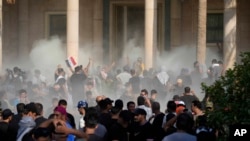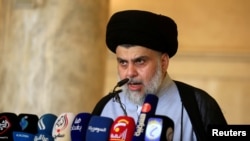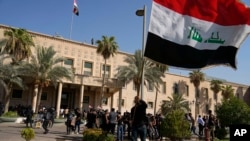Iraqi cleric Moqtada al-Sadr called on his supporters to end their protests and leave Baghdad's Green Zone on Tuesday after nearly two days of clashes with rival Shi'ite groups and Iraqi security forces left at least 22 people dead.
Al-Sadr apologized to the Iraqi people during a televised speech, which came a day after he announced he would resign from politics because of the country's political deadlock.
Later in the day, fighting appeared to die down. Local channels showed pro-Sadr protesters leaving the Green Zone.
"A revolution tainted by violence and murder is no revolution," Sadr said, reiterating that his retirement decision was final.
Shortly after al-Sadr's remarks, Iraq's military announced it was lifting a curfew order it put in place Monday in response to the unrest.
Iraqi Prime Minister Mustafa al-Kadhimi and other politicians welcomed Sadr's call for peace.
"The call of His Eminence Muqtada al-Sadr to stop the violence represents the highest levels of patriotism and desire to protect the blood of Iraqis," Kadhimi tweeted.
"His Eminence's speech affirms that everyone has a moral and national responsibility to protect Iraq's capabilities, stop escalating the situation politically and security-wise, and call for a quick and fruitful dialogue to resolve the crises," he added.
Clashes had continued overnight, and the military said earlier Tuesday that rockets were launched at the Green Zone, the heavily fortified area of the Iraqi capital.
Al-Sadr won the most seats in the October election, but not a majority. He withdrew all his lawmakers from parliament in June after refusing to form a coalition government with Iran-backed Shi'ite rivals.
Al-Sadr has insisted that the entire parliament be dissolved and early elections be held.
The stalemate has led to political uncertainty and volatility in the country. Al-Sadr's followers have been staging a weekslong sit-in at parliament to press the cleric's demands.
Al-Sadr has withdrawn from politics in the past only to later return to government. His critics have dismissed his latest move as an attempt to gain more power.
"This is not the first and won't be the last time that Sadr has declared resignation from politics," said Bilal Wahab, a prominent Iraq analyst at the Washington Institute for Near East Policy.
"He has changed his mind in the past and will do the same now. Sadr has a significant stake in Iraqi politics and state and even greater ambitions. I can't imagine he'll really abandon them. But declarations of resignation have proven an effective tactic and tool that he employs, which gives him the advantage of initiative and unaccountability," Wahab added.
The Shi'ite cleric has a large following, having gained support by opposing both the United States and Iran.
The United Nations Assistance Mission in Iraq called Monday's developments "an extremely dangerous escalation" of events in the country.
Some information in this report came from The Associated Press, Reuters and Agence-France Presse.







